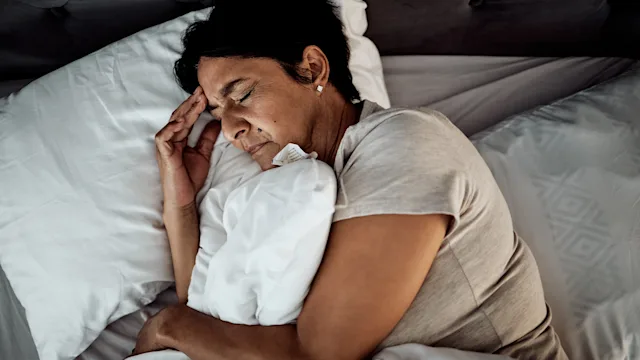Key takeaways:
Not getting enough good-quality sleep on a regular basis can increase the risk of developing Type 2 diabetes.
Lack of sleep interferes with how your body metabolizes glucose and responds to insulin.
Regular exercise and a healthy diet can lower your risk of getting Type 2 diabetes, but not as much as prioritizing good sleep.
We all need sleep to function at our best. And yet many people don’t get the regular, good-quality sleep that they need. In fact, one-third of U.S. adults report getting less than the recommended 7 hours of sleep at night.
If you’re one of them, you probably know how lack of sleep can affect your day to day. But beyond feeling groggy and unproductive, there are real and lasting health risks of not getting enough sleep night after night. Chronic lack of sleep has been linked to headaches, weight gain, heart disease, depression, and more.
And it can increase your risk for Type 2 diabetes.
Search and compare options
What is the connection between sleep and Type 2 diabetes?
Type 2 diabetes is the most common form of diabetes. It happens because the body isn’t able to produce or use insulin to balance blood glucose (sugar) levels. So, glucose levels build up in the blood and cause health problems.
Sleep helps your body balance its glucose levels. When you don’t get enough sleep, this can interfere with your body’s ability to keep glucose levels steady.
In a study of 250,000 people in the U.K., researchers found that regularly sleeping 5 hours or less was linked to a higher risk of developing Type 2 diabetes over an 11-year period. This risk of getting diabetes was increased compared to people who slept 7 to 8 hours a day.
Even in people who already have diabetes, a lack of sleep can make diabetes more difficult to manage.
How does lack of sleep increase the risk of Type 2 diabetes?
Sleep is vital to many of your body’s functions. It helps you lock in memories, repair and build muscle, and remove toxins that build up in the brain. And sleep is key to many of the processes involved in how our bodies regulate metabolism.
But it’s not completely clear how lack of sleep results in high blood-glucose levels and diabetes.
Read more like this
Explore these related articles, suggested for readers like you.
It’s likely a result of a few different body processes, including:
Insulin resistance, meaning the cells in the body do not respond to insulin (the hormone that lowers blood sugar) in a normal way
Activation of the sympathetic nervous system, also known as your fight-or-flight response, which releases more hormones — like cortisol — that increase blood sugar
Abnormal levels of several different hormones that affect metabolism and glucose regulation
Disruption of the gut microbiome, the healthy bacteria in the gut that helps maintain balance throughout the whole body
But it’s possible that there are other reasons, too, beyond what’s happening in the body. Evidence suggests that sleep deprivation may increase certain behaviors like consuming more calories, making impulsive decisions around foods, and drinking more alcohol.
How much sleep do you need?
Most people need at least 7 hours’ sleep a day to feel their best. Some people need more, some people need less. And some people need their sleep at different times of the night.
The amount of sleep you need depends on a few different things, including your age, health, lifestyle, and genetics.
But it’s not just how much you sleep you get. The quality of sleep you get matters too. You should aim to get enough sleep to wake naturally and feel refreshed.
Everyone benefits from regular, good-quality sleep. But not getting enough can impact people in different ways. Put another way, the connection between your health and your sleep habits is not just about how much — or little — sleep you’re getting. It’s likely determined by your genetics.
How to get a good night’s sleep
There are plenty of reasons why you might not be able to get regular amounts of good, restful sleep. Most commonly, this is due to a combination of your bedtime (or daytime) habits, your work, and your sleeping environment. Other factors include if you have kids, the medications you take, and what you eat and drink.
But poor sleep can also be caused by mental health problems, chronic pain, and sleep disorders, like obstructive sleep apnea.
Most people can improve their sleep with research-backed approaches. There is no single trick for better sleep. But if you are wondering where to start, a change in your bedtime routines, sleeping environment, and daily habits can help.
Sleep experts recommend:
Going to bed and waking up around the same time every day
Getting outside in direct sunlight in the morning — even if just for a few minutes
Incorporating movement or exercise into your daily routine, especially earlier in the day
Avoiding large meals, alcohol, caffeine, or screens in the evenings
Optimizing your bedroom for sleep with blackout curtains and cool temperatures
Tips to stay healthy if you can’t get enough sleep
So, what if you work shifts or your kids prevent you from getting enough sleep? Or maybe you’re one of the millions of Americans who (knowingly or not) have a sleeping disorder?
Can you make other changes to lower your risk of Type 2 diabetes even if you don’t sleep enough?
The answer is yes, partially. Researchers in the U.K. study mentioned above also looked at exercise habits and diet. They found that regular, high-intensity exercise and a healthy Mediterranean-style diet did help lower the risk for Type 2 diabetes — even in people who slept less than 6 hours a day.
But the evidence suggests that these healthy habits alone may not be enough to completely overcome the effect of poor sleep on the risk of diabetes.
In addition to tracking your sleep, here are other changes you can make to lower your risk of Type 2 diabetes:
Eat a nutritious diet. Favor a nourishing diet with lean meats, whole grains, and plenty of fresh fruits and vegetables.
Move your body. Healthy movement and exercise looks different for everyone. Experiment with different activities that feel good and doable to you.
It’s not easy, but quit smoking. Smoking increases your risk of Type 2 diabetes by 30% to 40%. Ask for support to start cutting back.
Get help for weight loss. If weight loss is a personal health goal, ask your primary care doctor for help. There are certain times when weight loss can help you achieve other health goals. This is true for excess fat, particularly around your abdominal area. Losing just 10% of your body weight can lower your risk for diabetes. If you have had a hard time with weight loss before, ask a healthcare professional you trust for help.
Try to minimize stress. Stress can increase blood glucose levels. Identify causes of stress in your life, and take steps to manage and reduce these.
The bottom line
Not getting enough good-quality sleep on a regular basis can increase your risk for Type 2 diabetes. This is because important functions happen during sleep that help regulate your metabolism. So, sleep deprivation over time can cause insulin resistance and high blood glucose levels, both of which contribute to Type 2 diabetes.
You can reduce your risk for diabetes through a nutritious diet and regular exercise, but neither of these can trump the healing power of good sleep.

Why trust our experts?


References
Centers for Disease Control and Prevention. (2022). Diabetes: Sleep for a good cause.
Centers for Disease Control and Prevention. (2022). Sleep and sleep disorders.
Grandner, M. A., et al. (2016). Sleep duration and diabetes risk: Population trends and potential mechanisms. Current Diabetes Reports.
Mesarwi, O., et al. (2013). Sleep disorders and the development of insulin resistance and obesity. Endocrinology and Metabolism Clinics of North America.
Nôga, D. A., et al. (2024). Habitual short sleep duration, diet, and development of Type 2 diabetes in adults. JAMA Network Open.
U.S. Food and Drug Administration. (2023). How smoking can increase risk for and affect diabetes.
















